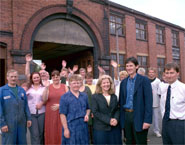Article from the local Potteries
newspaper: ![]()
Thursday 23rd December 1999
![]()
Potbank thrives after couple’s
rescue effort
 |
PICTURED:
Rosemary and William Dorling, front centre, with Mary Babb, great
granddaughter of the company's founder, and Kingsley Leigh, great grandson
of the founder, with the workforce at the time of the sale |
| The historic Burgess and Leigh is thriving once again after a husband and wife team stepped in to inject new life. | |
![]() This is a negative Christmas pottery story with
a difference. It is not the traditional Scrooge fayre of closures, redundancies
and four-day weeks. Instead, it is about expansion and revival...and helping to
exorcise the ghosts of Christmas past.
This is a negative Christmas pottery story with
a difference. It is not the traditional Scrooge fayre of closures, redundancies
and four-day weeks. Instead, it is about expansion and revival...and helping to
exorcise the ghosts of Christmas past.
Husband and wife team William and Rosemary Dorling have almost doubled the staff
at Burslem-based Burgess and Leigh since saving the company in August after it
had gone into receivership.
The order book for the new year is filling up, the BBC is considering the
company – now Burgess, Dorling and Leigh – for its One Foot in the Past
series in March, English Heritage and the National Trust are promoting it, and
the new owners have turned a nosedive into ‘‘a steady climb out of
trouble''.
Mr Dorling said of their factory, a listed building and the last working
Victorian pottery in Britain: ‘‘It was a buried treasure that time had
passed by. We just had to have it. You find pearls in the oddest places. We
always knew this was a gem.''
![]() The Dorlings were running a small ceramics mail order business 200 miles south
in Hampshire when Burgess and Leigh went into receivership in June.
The Dorlings were running a small ceramics mail order business 200 miles south
in Hampshire when Burgess and Leigh went into receivership in June.
They were as shocked as the 55 employees, who were just about to begin their
annual two-week summer holiday. The Dorlings were as dependent on Burgess and
Leigh as the Burslem company's own staff. Mr Dorling explained: ‘‘Seventy
per cent of our sales came from Burgess and Leigh stock. If Burgess and Leigh
went under, so did we.''
![]() There was only one certain way of ensuring that both the historic Stoke-on-Trent
historic and the Hampshire family survived intact. Said Mr Dorling: ‘‘We had
to buy it. And we did. Although we were in the ceramics business, we hadn't a
clue about pottery production.
There was only one certain way of ensuring that both the historic Stoke-on-Trent
historic and the Hampshire family survived intact. Said Mr Dorling: ‘‘We had
to buy it. And we did. Although we were in the ceramics business, we hadn't a
clue about pottery production.
‘‘We bought the factory one day, dropped everything the next and moved into
a B&B near Alton. We've been living their ever since. We haven't had time to
look for a house of our own.''
They were no strangers to gambling in business. They were originally in the
legal profession and then started their ceramics mail order company with £200
when both were out of work.
Their funds for Burgess and Leigh came from a mortgage and family. They even
asked Prince Charles to help them, but he did not feel that royal patronage
should extend that far.
![]() When the receivers from KPMG's corporate recovery division moved in, a big
question mark hung over the whole future of Burgess and Leigh, despite its £1
million annual turnover.
When the receivers from KPMG's corporate recovery division moved in, a big
question mark hung over the whole future of Burgess and Leigh, despite its £1
million annual turnover.
The staff had been reduced from 55 to 18 by the time the sale was agreed. Now
that number has one by one increased to 33, with the prospect of even more jobs
in 2000 if sales continue to rise.
Burgess and Leigh started life modestly in 1862 and moved to its current
canalside factory in 1888. During the 1930s, it developed a worldwide
reputation, particularly for its products inspired by art deco designer
Charlotte Rhead.
![]() In October they opened a factory shop, installed a counter from the last working
silk mill in Leek, and arranged the firm's distinctive blue and white
‘‘burleigh ware'' on Victorian racking and the original wooden floorboards.
In October they opened a factory shop, installed a counter from the last working
silk mill in Leek, and arranged the firm's distinctive blue and white
‘‘burleigh ware'' on Victorian racking and the original wooden floorboards.
How has the turnaround been achieved in the relative blink of an eye?
Mr Dorling said: ‘‘It's been a labour of love – and still is. Every day,
every minute.''